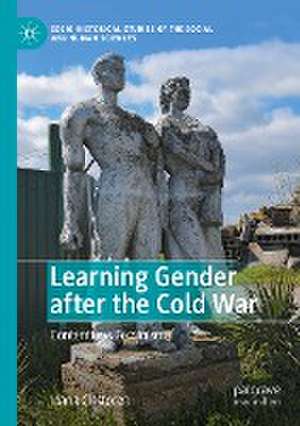Learning Gender after the Cold War: Contentious Feminisms: Socio-Historical Studies of the Social and Human Sciences
Autor Ioana Cîrstoceaen Limba Engleză Paperback – 22 sep 2023
| Toate formatele și edițiile | Preț | Express |
|---|---|---|
| Paperback (1) | 643.65 lei 6-8 săpt. | |
| Springer International Publishing – 22 sep 2023 | 643.65 lei 6-8 săpt. | |
| Hardback (1) | 649.06 lei 6-8 săpt. | |
| Springer International Publishing – 21 sep 2022 | 649.06 lei 6-8 săpt. |
Preț: 643.65 lei
Preț vechi: 757.24 lei
-15% Nou
Puncte Express: 965
Preț estimativ în valută:
123.16€ • 128.60$ • 101.70£
123.16€ • 128.60$ • 101.70£
Carte tipărită la comandă
Livrare economică 15-29 aprilie
Preluare comenzi: 021 569.72.76
Specificații
ISBN-13: 9783030978907
ISBN-10: 3030978907
Pagini: 412
Ilustrații: XIV, 412 p.
Dimensiuni: 148 x 210 mm
Greutate: 0.51 kg
Ediția:1st ed. 2022
Editura: Springer International Publishing
Colecția Palgrave Macmillan
Seria Socio-Historical Studies of the Social and Human Sciences
Locul publicării:Cham, Switzerland
ISBN-10: 3030978907
Pagini: 412
Ilustrații: XIV, 412 p.
Dimensiuni: 148 x 210 mm
Greutate: 0.51 kg
Ediția:1st ed. 2022
Editura: Springer International Publishing
Colecția Palgrave Macmillan
Seria Socio-Historical Studies of the Social and Human Sciences
Locul publicării:Cham, Switzerland
Cuprins
1 (Re)Making “Gender”, (Un)Making “Eastern Europe”. Introduction.- “Gender” and Feminism After State Socialism.- Brief Literature Overview.- Mapping the “East-West Misunderstanding” in Feminism.- “Gender” as a Socialisation Platform.- Doing the Sociology of a Transnational Melting Pot.- Bibliography.- Part I Transnational Mobilisations: From Discovering the “Post-socialist Other” to Professional Activism Beyond Borders.- 2 Reviving Feminist Internationalism After the Cold War.- Transatlantic Conversations.- A “Feminist Powerhouse”.- “US Writers, Professors, Feminist Activists”.- Eastern European Feminists “In-Between”.- “Sisterhood” Versus “Difference”: An Iterative Debate, a Historically Situated Outcome.- Bibliography.- 3 The “NGO-isation of Feminism” in the Making.- Feminism as a “Trademark”.- Towards the “NGO Form”.- Inventing and Practicing Lateral Solidarity at a Distance.- An Expert Look and an Informal Habitus.- Transnational and Trans-Sectorial Circulations.- Bibliography.- Part II The Institutional Building of International Gender Expertise.- 4 A Democracy-Making Mission.- A Young Philanthropic Foundation.- Fighting Against Communism and Training the Post-Socialist Elites.- “Expanding Rights-Based Education”.- Bibliography.- 5 Aims and Scope of an International Gender-Studies Programme.- Activist Origins.- Structural Tensions.- Critical Vocation and Expert Potential.- Teaching and Research, International Transfers and Local Innovations.- Bibliography.- 6 Gender, Feminism and Philanthropic Work.- “Generating an Agenda”.- Feminist Activists and Bureaucracy Employees.- Learning “Gender” and Resisting International Pedagogy.- Bibliography.- Part III A Sociography of Eastern European “Gender Pioneers”.- 7 Feminist Scholars, Activists and Experts.- Shared Social Dispositions.- Established Scholars and Newcomers to Academia.- Professional Activists and Critical Bureaucrats.- Historically “Rooted” Militancy.- Bibliography.- 8 Gender Studies and the Higher Education Reform in Romania.- Liberalising the Universities After State Socialism.- A Small World of Activists and Reformers.- Interwoven Academic and Expert Positions.- Bibliography.- 9 A Counterpoint from the Former Yugoslavia.- “Gender” and Feminism in Tension.- The Ambiguous Paths of “Gender Expertise”.- Legacy of State Socialism and Counter-Hegemonic Thinking.- Bibliography.- 10 Going Global. Conclusion.- “Sisters in Feminism”, Brokers of “Gender”, Actors of Globalisation.- The End of the “Second World” and the Afterlife of the (Red) “Woman Question”.- Bibliography.- Appendix.- Bibliography.- Index.
Notă biografică
Ioana Cîrstocea is a Sociologist at the French National Centre for Scientific Research, CNRS, and a member of the European Centre for Sociology and Political Science, CESSP, Paris, France. Her research focuses on intellectual spaces and actors in Eastern Europe and on the production, circulation and usages of feminist knowledge in (post)-Cold War settings.
Textul de pe ultima copertă
This book explores the role and place of feminist politics in the transformation of the former socialist world and points out the geopolitical mechanisms involved in the deployment of technocratic norms, expert discourses, activist repertoires and academic knowledge on women’s rights and gender equality in the 1990s-2000s.
Based on an interdisciplinary approach and scrutinizing transnational flows of people, resources and ideas, the analysis brings together themes and spaces that have been disconnected in previous scholarship. It sheds light on the integration of feminist resources into contemporary governance through complex entanglements of international aid to democratization, “activism beyond borders” and systemic transformation of higher education.
The book will be of interest to researchers and students of sociology, political science, gender studies, and East-European studies.
Ioana Cîrstocea is a Sociologist at the French National Centre for Scientific Research, CNRS, and a member of the European Centre for Sociology and Political Science, CESSP, Paris, France. Her research focuses on intellectual spaces and actors in Eastern Europe and on the production, circulation and usages of feminist knowledge in (post)-Cold War settings.
Caracteristici
Analyses the role that Eastern European feminism played in questioning global democratization Shows how “gender” was established as a concern in multiple settings and activity sectors Focuses on the transnational and trans-sectorial circulations of feminist ideas, practices and actors






